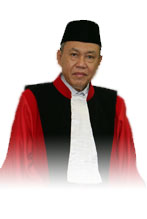Wahiduddin Adams is a former justice of the Constitutional Court of Indonesia. He and Aswanto were appointed to the court by the People's Representative Council in March 2014.[1] Prior to serving on the bench, Adams was the Director General of Legislation at the Ministry of Law and Human Rights.[2][3][4]
Wahiduddin Adams | |
|---|---|
 | |
| Justice of the Constitutional Court of Indonesia | |
| President | Susilo Bambang Yudhoyono Joko Widodo |
| Succeeded by | Arsul Sani |
| In office 21 March 2014 – 18 January 2024 | |
| Personal details | |
| Born | 17 January 1954 Palembang, South Sumatra, Indonesia |
| Alma mater | Syarif Hidayatullah State Islamic University Jakarta |
| Occupation | Judge, Bureaucrat |
During his tenure as Director General, he often represented the Government of Indonesia in cases of judicial review.[5] Adams has been notable for his position in support of gender-based affirmative action for membership in the People's Representative Council.[6] However, he was also among the minority judges who supported the criminalization of pre-marital sex and homosexuality in the Constitutional Court's decision in 2017.[7]
References
edit- ^ Bonardo Wahono, Indonesian Election Dispute In the Hands of These Nine Judges. Wall Street Journal, 14 August 2014.
- ^ Fathan Qorib and Mahinda Arkyasa, Draft Revision of Criminal Code and Procedures Moves Forward to House, 27 December 2012. Accessed 15 September 2016. HukumOnline English.
- ^ Indonesia may outlaw unmarried sex with jail threatened for offenders, 21 March 2013. Accessed 15 September 2016. News.com.au.
- ^ Ahmady, Eagerly anticipating the Aceh truth commission, 18 December 2013. Accessed 15 September 2016. Jakarta Post.
- ^ Ina Parlina, Constitutional Court justice race 'a test' for House, 24 February 2014. Accessed 15 September 2016. Jakarta Post.
- ^ Court upholds MD3 Law, rejects PDI-P's judicial review request, 30 September 2014. Accessed 15 September 2016. Jakarta Post.
- ^ Butt, Simon (2 September 2018). "Religious conservatism, Islamic criminal law and the judiciary in Indonesia: a tale of three courts". The Journal of Legal Pluralism and Unofficial Law. 50 (3): 410–412. doi:10.1080/07329113.2018.1532025. hdl:2123/29626.